Visit by Dr Jens Weidmann, President of the Deutsche Bundesbank, to Greece at the invitation of the Hellenic Bank Association
On 30 August 2018, the Hellenic Bank Association hosted a gala dinner in honour of Dr Jens Weidmann, President of the Deutsche Bundesbank. Other guests included the Deputy Prime Minister and Minister of Economy and Development Mr Yannis Dragasakis, the Vice President of the Nea Dimokratia political party Mr Kostis Hatzidakis, the President of the Movement for Change (KINAL) political party Mrs. Fofi Gennimata, representatives of the Greek political community, the Governor and Deputy Governors of the Bank of Greece, the heads of the Hellenic Financial Stability Fund, the Hellenic Capital Market Commission and the Athens Exchange Group, the board members of several Greek banks, and representatives from the business federations SEV-Hellenic Federation of Enterprises and SETE-Greek Tourism Confederation, as well as a number of prominent Greek entrepreneurs and executives.
The distinguished guest and speaker was introduced by the Chairman of the HBA, Mr Nikolaos Karamouzis, who thanked Mr Weidmann both for having accepted the invitation of the HBA’s board members to be the keynote speaker at the event, as well as for taking the initiative to meet HBA in Frankfurt earlier this year, together with representatives of the Greek and German business communities. Mr Karamouzis stressed that it was a great honor for the country to welcome Mr Weidmann, who is a leading European figure known for his intriguing, consistent and well-argued point of view.
In his welcome speech, the Chairman of the HBA mentioned briefly the progress towards recovery made by Greece’s economy and banking system, as confirmed by Greece’s recent exit from the economic adjustment programmes after eight years, but stressed that significant challenges lie ahead and require a responsible and prudent reform policy which promotes strong, sustainable growth and a recovery in investment.
During his speech entitled "Exploring the agora: Lessons for a more stable economic and monetary union", Mr Weidmann highlighted, inter alia, the strides that Greece has made on the path towards fiscal and economic sustainability. He also stressed the severe social and economic hardships that were inflicted by the adjustments. “Acknowledging the sacrifices, I have great respect for the Greek people and the way in which you all endured this difficult period,” he said. While also pointing to burgeoning economic growth, Mr Weidmann cautioned that 20 August was not the finishing line, but a milestone on a long road to recovery, noting that “additional growth-friendly structural reforms would bring the economy onto a steeper growth path, and provide greater job opportunities and faster growth in productivity and real wages.” He also acknowledged the interdependencies between euro area member states. Regarding the debate on reforming the euro area, Mr Weidmann stated: “making the euro area more stable does not require us to decide between solidarity and solidity. The opposite is true: we need both solidarity and solidity.”








